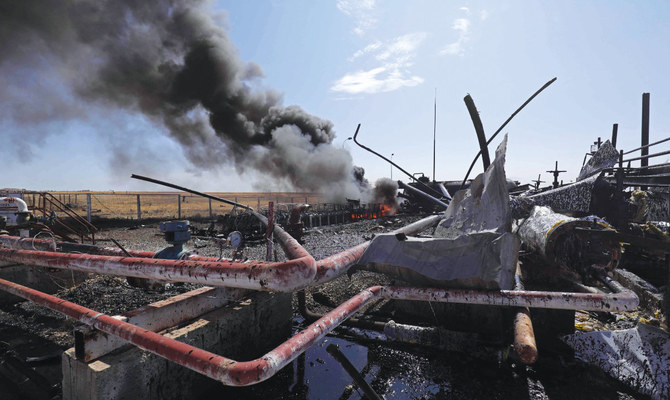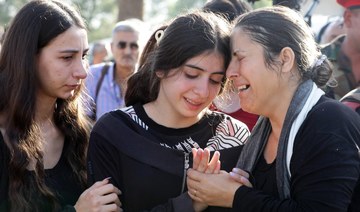ANKARA: The downing of a Turkish drone by US forces in northeastern Syria on Thursday night has raised concerns over its ramifications for the already-fragile relationship between Ankara and Washington. But both parties have moved quickly to de-escalate tensions.
Turkiye’s armed forces and its National Intelligence Organization launched military operations in northern Syria in response to the suicide bombing outside the Turkish Interior Ministry in Ankara on the morning of Oct. 1, which Turkish authorities have stated was carried out by individuals affiliated with the outlawed Kurdistan Workers’ Party (PKK) who had infiltrated the country from Syria.
The operations targeted several locations connected to the PKK and its Syrian affiliate, the People’s Protection Units (YPG), in the Tell Rifaat, Jazira, and Derik regions of northern Syria.
Turkiye launched retaliatory airstrikes just a few hours after its foreign minister, Hakan Fidan, publicly declared that the PKK and its infrastructure in Syria and Iraq were “legitimate targets.”
The US military took the decision to shoot down the Turkish drone when it came within 500 meters of American troops in Hasakah, Syria.
This rare incident has placed the two NATO member states in a precarious situation.
US officials moved quickly to mend relations, while underscoring the value of its partnership with Ankara.
Air Force Brig. Gen. Patrick Ryder, the Pentagon press secretary, said the drone incident was “regrettable” and emphasized that US troops were responsible for taking safety precautions when Turkiye conducted airstrikes nearby.
“We have no indication that Turkiye was intentionally targeting US forces,” Ryder stressed to reporters.
Turkiye’s National Defense Minister Yasar Guler and US Defense Secretary Lloyd Austin also held a meeting over the phone to discuss recent developments, as did Chief of the General Staff of the Turkish Armed Forces Gen. Metin Gurak and Gen. Charles Brown Jr., the US Air Force chief of staff.
The Pentagon acknowledged Turkiye’s legitimate security concerns, called for de-escalation in northern Syria, and emphasized the need for continued communication through military channels with Turkiye.
Austin “reaffirmed his commitment to close coordination between the US and Turkey to minimize any risk to US forces or the Global Coalition’s Defeat-ISIS Mission in northeast Syria, in support of the campaign to defeat (Daesh),” according to a statement.
US Secretary of State Antony Blinken also spoke with Fidan on Friday evening.
“We discussed coordinating and de-conflicting activities in pursuit of our common objective of defeating terrorist threats,” Blinken posted on social media platform X.
Fidan reportedly told his US counterpart that “the US, as an ally, should stop working with the terrorist organization YPG in northern Syria,” according to a statement from the Turkish Foreign Ministry.
There are approximately 900 US troops in northern Syria. They predominantly cooperate with the Kurdish-led Syrian Democratic Forces.
However, this collaboration has long been a point of contention for Ankara, which views the SDF as an offshoot of the PKK and has, since 2015, been urging Washington to stop training and arming Kurdish YPG militants in Syria.
While a ground operation in Syria remains an option for Turkiye, Soner Cagaptay, senior fellow at The Washington Institute, does not consider it a likely course of action. Instead, he expects tactical operations to continue in much the same vein.
“The US reaction is not so much (about preventing) Turkiye from attacking the PKK and its affiliates, but is mainly driven by Washington’s message to Ankara not to come near or target US troops, which goes back to the targeting of YPG leader Ferhat Abdi Sahin — codenamed Mazloum Abdi — by suspected Turkish drones when US personnel accompanied him in a convoy near Sulaimaniyah International Airport,” Cagaptay told Arab News.
“I think the US red line is that US personnel and troops must not be put in harm’s way. Washington does not want to escalate beyond that, and Ankara is also not interested in escalating the tension,” he added.
A statement from the Turkish Ministry of Foreign Affairs on Ankara’s cross-border attacks against the PKK and its affiliates in Iraq and Syria on Friday did not mention the US. Ankara said the drone “was lost due to different technical assessments in the deconfliction mechanism with third parties. Necessary measures are being taken to ensure a more effective operation of the deconfliction mechanism with the relevant parties.”
Reading between the lines, Cagaptay said that the statement meant: “Basically, we don’t want to escalate with the US, but we also retain the right to operate in the area against the PKK.”
Fidan and Blinken reportedly agreed to continue operating the current de-escalation mechanism between Turkish and US forces in Iraq and Syria “in a way that would not hinder” Turkiye’s counter-terrorism efforts.
In Cagaptay’s opinion, the US government has always — grudgingly and to the dismay of US Central Command — given the green light to Turkish operations in Syria targeting the YPG.
“The pattern is that whenever they make an incursion, the US pulls out of the way, and there is some coordination to ensure US troops don’t come to harm,” he said.
Turkiye’s last major military operation in Syria took place in late 2019 and was intended to push terror groups back from its borders.
Cagaptay does not expect a full-scale Turkish incursion, as that would require coordination with both Russia and President Bashar Assad’s regime in Syria.
“There are so many other powers holding veto over that decision, especially Russia. I think Turkiye will double down on its drone war against the YPG and the PKK while using special operations and other troops inside to go after PKK camps and establish a cordon sanitaire inside Iraq that now stretches, in most places, 10 km deep inside Iraqi territory and takes the Iraqi-Turkish border from a very rugged line with 7,000-feet-tall mountains to a more defensible perimeter with 1,000-feet-high mountains,” he said.
He added that a full-scale incursion would “require threading the needle with Russia and the US, requiring a meeting between President Recep Tayyip Erdogan and President Vladimir Putin, and approval from Assad.”
The US has, meanwhile, recently urged Ankara to approve Sweden’s NATO accession. In response, Turkiye reminded Washington of its commitment to provide Ankara with F-16 fighter jets.
Turkiye also insists that Sweden must eliminate all PKK activities on its soil.
Cagaptay believes that Turkiye now has the upper hand in those discussions.
“Washington is expecting Turkiye to ratify Sweden’s accession to NATO, and no one wants to see the relationship reach a crisis point that would delay (that). If not for this PKK bomb attack, ratifications would have happened and relations would have improved significantly with confidence-building measures put in place.”
Cagaptay concluded that the PKK’s attack in Ankara had achieved its goal, “because the Turkish-US relations reset is now set back.”

























